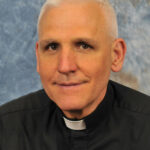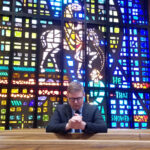
Autumn Wagner, right, a nursing student from St. Ambrose University in Davenport, takes a break with another volunteer during a service trip to Honduras last month.
By Anne Marie Amacher
The Catholic Messenger
DAVENPORT — One group of St. Ambrose University students learned about the history of systemic injustice and existing justice issues that the Lakota people experience on Pine Ridge Reservation in South Dakota. Another group lived with an international faith-based Catholic community at Jerusalem Farm in Kansas City, Missouri doing gardening, learning about the area’s social justice issues and repairing homes. A group of nursing students traveled to Honduras with Global Brigades for a medical mission trip. All of these students chose to volunteer during their spring break, said Nicky Gant, SAU’s service and justice coordinator.
Pine Ridge Reservation
Severio Hernandez, a senior music major, chose to volunteer in Pine Ridge to do some meaningful work that could have a positive effect. “The Lakota tribe has experienced significant land loss due to treaties that frequently were coerced or violated by the U.S. government,” he said. “The loss of territory has deeply affected these communities, which has led to profound cultural, economic and spiritual consequences.” Hernandez said Pine Ridge “ranks as the poorest county in our nation.” He and other volunteers chopped wood for fires; made, assembled and delivered bunk beds; toured the area; and listened to the Lakota people’s history and stories.
Ryan Hoerner, a junior majoring in forensic psychology, said most people on the reservation do not have jobs as bigger towns and cities are more than an hour away. “People make and sell jewelry or various art pieces as a way to get by.” Many people within the Lakota community do not have running water or electricity, “so the wood we chopped and delivered heats their homes. They have to wait a long time to receive wood or a bed because there are so many people to get to within Pine Ridge.” He identified mental health issues and alcoholism as big struggles as people try to cope with their daily lives.
“I knew that reservations did not have the best living conditions. But I had no idea that Pine Ridge was essentially ‘third world country poor’ in a first world country. It was heartbreaking to learn about and see.” However, the Lakota people’s culture and community inspired him. “I’m incredibly grateful I got to be a part of that for a week.”
Jerusalem Farm
Amelia Von Alexander, an elementary education major, chose to volunteer at Jerusalem Farm because of its “commitment to sustainability, and the community around them is a cause that is near to my heart. I learned a lot about the diversity of the Kansas City community, especially the neighborhood surrounding Jerusalem Farm, and the challenges that many of their neighbors face.”
Nora Dibble, a freshman nursing major, described traveling the neighborhood by bicycle to collect compost. “We had conversations with the leader who lived there and it was cool to hear about the neighborhood,” she said. The group saw the huge impact the composting effort has on the community garden and orchard. They helped chop the compost they collected and added leaves and turned piles of existing compost. “It was special to see how the simple thing of putting food and dirt together can make this luscious soil that is put back into the neighborhood.”
Jerusalem Farms also helps low-income homeowners fix their homes and works with the city regarding financial issues. “So many people need help just to stay in their homes,” Dibble said. The volunteers helped at a neighborhood home with caulking, trimming, painting and installing a new refrigerator, washer and dryer. “I was with two elementary education majors who also took the time to babysit a little girl and provide Thomasa (the homeowner) some time off. They were able to use their Spanish skills and their teacher skills to make the little girl so happy.” Dibble said the experience taught her “to be grateful for what I have and to continue to use my gifts to serve people who are less fortunate.”
Honduras
A team of 23 from varying professions and students from St. Ambrose University, along with volunteers from elsewhere, provided dental and eye care to hundreds on their medical mission trip. Tori DeClercq, a junior nursing student, said the mission had a medical and a public health service component. The medical brigade helped triage patients, provided eye exams and assessed nutrition. The students also assisted with women’s health tests, dental services, health practices education and a pharmacy for discounted drugs.
“While working in the optometry area, I was involved in helping more than 100 individuals get reading/prescription glasses. As someone with glasses, I can’t even imagine going as long as some of them have without the proper tools,” DeClercq said. During the public health experience, she helped build a sanitation station (shower, toilet and sink) for a family in need.
Julia Beltz, a junior majoring in social work and Spanish, put her Spanish language education to good use. “I had the opportunity to assist in teaching children about dental health, I taught adults about mental health, and I also translated many conversations between children and adults in the villages” along with the program’s leaders. “I loved being in many different conversations and using my Spanish language skills outside the classroom.” The broken healthcare system struck her. “I now have a deep desire for learning more about public health and how we can improve the healthcare system over time worldwide,” she said.
Nicole Kleronomos, a senior nursing major, said going to Honduras “allowed me to observe diverse communities that can help me now and in the future when providing care here in the United States.” Her biggest takeaway was learning about the challenges Hondurans face in accessing medical buildings and clinics. Many people “live in rural communities in which they might have little to no transportation to get to a clinic that could be hours away. That is why medical brigades within Global Brigades or other organizations are vital to the communities,” she said. “Without these visits, a lot of these people would not be seen or looked at unless it was a serious emergency in which they would have to go to a major city to receive care.”
Hernandez said he strongly believes that “participating in a service trip should be a requirement for all college students. The lessons learned and the things I felt during my experience will forever stay with me.”











